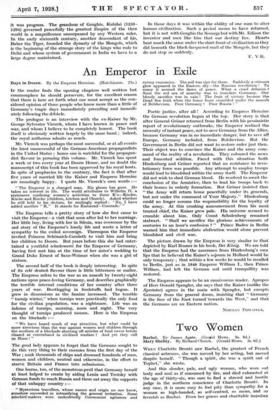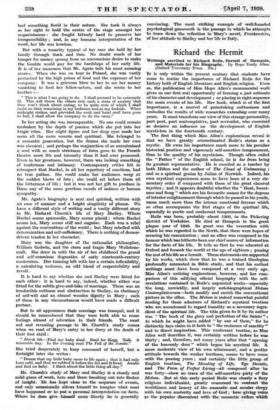Two Women
WHEN Charlotte Brontë saw Rachel, the greatest of French classical actresses, she was moved by her acting, but moved despite herself. " Though a spirit, she was a spirit out of Tophet," she wrote.
And this slender, pale, and ugly woman, who wore out body and soul as if consumed by lire, and died exhausted at the age of thirty-six, was sure to find a shrewd and hostile judge in the northern conscience of Charlotte Bronta. In any case, it is more easy to feel pity than sympathy for a woman so high-handed, so self-centred, so mean, and so feverish as Rachel. Even her graces and charitable impulses had something florid in their nature. She took it always as her right, to hold the centre of the stage amongst her acquaintances : she fought bitterly hard to preserve her irresponsibility ; and, in any humane interpretation of the _ word, her life was loveless.
But with a tenacity typical of her race she held by her family through thick and thin. No doubt much of her hunger for money sprang from an unconscious desire to make the Gentile world pay for the hardships of her early life. It is of her meanness that Mr. Agate tells his most amusing stories. When she was on tour in Poland, she was vastly perturbed by the high prices of food and the expenses of her company. It was a grievous blow to her to see her money vanishing to feed her fellow-actors, and she wrote to her brother :--
" This is what I am going to do. I shall pretend to be extremely ill. This will throw the others into such a state of anxiety that they won't think about eating, to be quite sure of which I shall insist on their remaining in my bedroom and at my bedside. When midnight strikes, and provided the cook and hotel staff have gone to bed, I shall allow the company to do the same."
In her acting she was incomparable. No one could remain unshaken by the depth of passion which she put into her tragic roles. Her slight figure and her deep eyes made her seem all the more remote and spiritual. She belonged to a romantic generation, but the drama she made her own was classical ; and perhaps the conjunction of so unrestrained soul with so much strictness of form gave to the French theatre more life and intensity than it had ever possessed. Even in her greatness, however, there was lacking something of tenderness and intimacy. Contemporary critics felt in retrospect that Rachel, in all her repertory of emotions, had no true pathos. She could make her audiences weep at the sudden blows of fate ; she could set before them all
bitterness of life ; but it was not her gift to produce in them any of the more gracious moods of sadness or human sympathy.
Mr. Agate's biography is neat and spirited, written with . an ease of manner and a bright simplicity of phrase. We have a different style of writing and a vastly different story in Mr. Richard Church's life of Mary Shelley. Where Rachel seems spasmodic, Mary seems placid ; where Rachel seems lax, Mary seems stiff and angular. Each was a rebel against the conventions of the world ; but Mary rebelled with determination and self-sufficiency. There is nothing of demon- driven tension in her character.
Mary was the daughter of the rationalist philosopher, William Godwin, and the stern and tragic Mary Wollstone- craft. She drew in with the air of her childhood the grand and self-conscious dogmatics of early .nineteenth-century modernism. Her training left with her a certain inflexibility, a calculating rashness, an odd blend of respectability and revolt.
It is hard to say whether she and Shelley were fitted for each other : it is hard -to say, 'indeed, whether either was fitted for the subtle give-and-take of marriage. There was an irreducible coldness and abstraction in Shelley, an obstinacy of self-will and an almost wooden dignity in Mary ; each of them in any tircumstances would have made a difficult partner.
But to all appearance their marriage was tranquil, and it should be remembered that they were both able to rouse feelings almost of adoration in their friends. The most sad and revealing passage -in Mr. Church's study comes when we read of Mary's entry in her diary at the death of their first child :
" Mardi 6th.--Find my baby dead. Send for Hogg. Talk. A miserable day. In the evening read The Fall of the Jesuits."
She tried desperately to keep command of herself, but a fortnight later she writes :
" Dream that my little baby came to life again ; that it had only been cold, and that we rubbed it before the fire and it lived. Awake and find no baby. I think about the little thing all day."
Mr. .Church's study of Mary and Shelley is a steady and solid piece of -work, here and there breaking out into flashes of insight. He has kept close to the sequence of events, and only occasionally allows himself to imagine what must have -happened or to put a personal interpretation on facts. Where he _does give himself more liberty he is generally convincing. The most striking example of well-founded psychological guesswork is the passage in which he attempts to trace down the reflection in Mary's novel, Frankenstein, of her attitude to Shelley and her life in Italy.







































 Previous page
Previous page